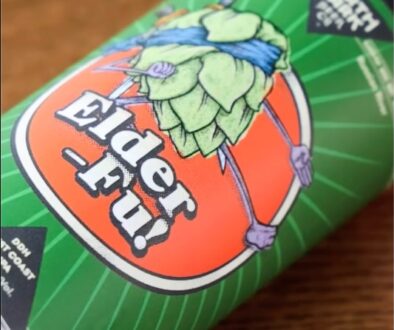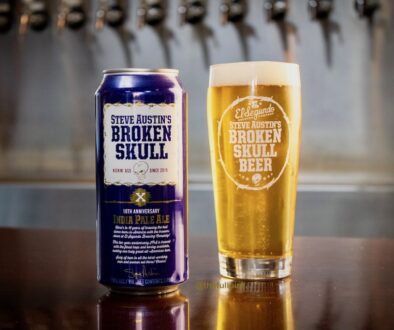Epic Brewing Presents – Sour Brainless on Peaches A Tincture of Time
(Salt Lake City,UT) – For over a year and a half we have been patiently waiting to share this exceptional new beer with you. Now, we’re happy to introduce Sour Brainless on Peaches a very well cellared and soured Belgian Golden Ale aged with Peaches. Dave Cole, Epic’s Co-Founder, has detailed the entire project in the attached letter, A Tincture of Time.
This time we did it on purpose. It’s delicate yet firmly poised, it’s been chiseled and polished and even worn in, comfortable and gratifying because it’s mostly not by chance. We’ve crafted a truly exceptional SOUR Brainless on Peaches.
Our sour program has, literally, been in the works since we founded the brewery in 2010, with the vision of brewing truly sour beers made with real fruit. That vision got a major jump start shortly after we opened our Denver Brewery, in August of 2013, with the purchase of three 60 hectoliter Oak Foeders from New Belgium Brewing. These wonderful wooden vessels will, forever be seen as a very special gift from our friends in Fort Collins.
Some followers may recall when a beautiful disaster struck in 2014 (click here for that story) and our Brainless on Peaches casks were contaminated with a peculiar wild yeast that left them sour but with a complex peach flavor that worked very well with the Belgian characteristics of our big, 9% ABV base beer, Brainless Golden Ale. This “Wild” Brainless on Peaches was not the sour beer we always intended; it was much stronger than we had dreamed of, and certainly wild with some sharp edges. Nonetheless, it was “A Beautiful Disaster,” a gift from nature and something we hoped to capture beyond a solitary “batch of chance.” We isolated and banked the wild yeast, then attempted several fermentations, but nothing worked. Even the tincture of time failed to revive this wild strain to anything remotely close to its one-time-strength and glory. Wild Brainless on Peaches remains a true one-off, lost forever.
Almost two years ago, in the fall of 2013, we filled two of the three foeders with a new sour base beer. One foeder was inoculated with Lactobacillus and another with Brettanomyces. At the same time we filled about 10 wine casks and inoculated them with Pediococcus. We feared Pediococcus: it might be the devil, and someone even marked the barrels with skull and crossbones. There was no way in hell we were going to put Satan into one of those larger, lovely wooden vessels. So, the third foeder sat waiting, destined to be used for blending both pre-wine-cask and post-fruited-wine-cask, a simple intermediate blending and maturation tank. The plan, (drawn while imbibing) was clearly laid out in the historical illustration here.
During 2013 through 2015 we regularly sampled each vessel to gauge its transformation. The early tastings were the worst part of the process. The Pediococcus casks were particularly offensive, rude, and tasted like whatever evil-day-old-room-temperature-vomit might taste like, mixed in with who knows what else. These early tastings filled us with doubt and regret along with a lingering nasty aftertaste. But after about a year of maturation the beer had transformed into an exceedingly sour, dry, and nuanced gem which we began to cherish. Out of them all, it was the Pediococcus casks that became our favorite souring “tool.”
Once we decided the beer was ready to meet fruit, we blended a portion of both foeders and all of the Pediococcus casks into neutral white wine casks with fresh peach puree. These casks underwent a third fermentation and additional aging which contributed substantially to the amount acid and brought the beer into balance. The art of sour beer is patience and flexibility. Moving into smaller wood casks allows us to select only the best of the best and only at the perfect time. The timing and amount is determined by the beer and not production schedules. We’ve waited over a year and half for this beer to develop and while the next batch might not take as long, it’s also not going to be rushed. And yes, we did inoculate that third foeder with Pediococcus for future releases.
Sour Brainless on Peaches emphasizes the fruit’s aromatics, not its sweetness. The sourness is derived from the Lactobacillus and Pediococcus with a little bit of Brettanomyces funk and tartness layered in, adding depth and complexity. The finish is tart, sour, and very dry, with maybe a touch of perceived sweetness from the Brainless Belgian Yeast. This is a beer that should be appreciated on the warmer side of cold. We took our time crafting this beer, and we hope you’ll take yours enjoying it.
The initial release is very small, with only a few cases going to each market. If sour beer is your passion then I encourage you to seek it out. Future releases are planned but no firm timelines can be established. Look for release announcements and availability on our social media accounts and website in the months of June and July.




